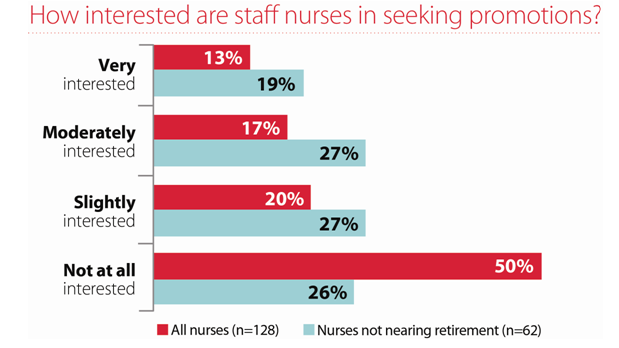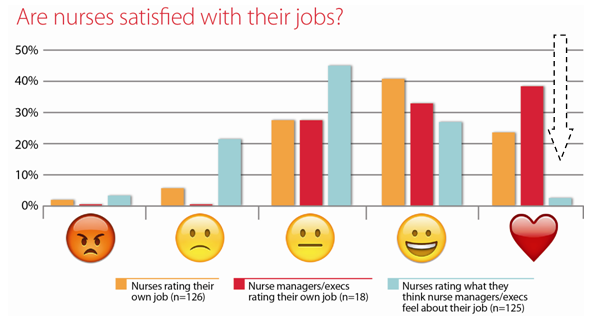Perioperative nursing leaders have their work cut out for them to recruit, retain and develop tomorrow's leaders amid an aging workforce and national nursing shortage.
The Bureau of Labor Statistics projects national nurse employment will increase 15 percent by 2026, more than double the 7 percent average growth rate for all occupations.1 Yet demand is still outpacing growth in the field, largely due to increasing healthcare needs of the baby boomer population compounded with an aging nursing workforce. Fifty percent of nurses are age 50 or older,2 and more than 500,000 nurses are expected to retire by 2022, creating 1.1 million open positions for new nurses to expand and replace retirees.3
About 55 percent of top-level nurse managers said the current nursing shortage had a moderate to crisis-level effect on their working environment in 2015, up from 40 percent a year prior. Seventy percent of nurses also shared this belief, compared to just 60 percent in 2014.4
This transformation in the nursing workforce can offer numerous career advancement opportunities for younger nurses who are early in their careers. However, not all young nurses are looking for promotions. Many young professionals today value flexibility and change in the workplace over more traditional models, such as staying at one organization and working their way up the leadership ladder.
"The failure to develop the next generation of nursing leaders puts organizations at risk from a business performance perspective," said Donna Doyle, DNP, RN, administrative director of surgery and anesthesia at OhioHealth Grant Medical Center in Columbus. "Additionally, access to surgical care is a concern of the Institute of Medicine and access to surgical care may be compromised if nursing leaders are absent from the surgical arena."
With such serious consequences in mind, Cardinal Health examined challenges related to developing the next generation of nurse leaders through discussions with perioperative advisory boards, including operating room directors and vice presidents of service lines. The company also polled 128 frontline nurses and 18 nurse managers via an online survey fielded through the Cardinal Health RNspire Facebook community of more than 100,000 members in October 2017.
How interested are staff nurses in seeking promotions?
Half of all staff nurses participating in the online survey were 'not at all' interested in pursuing a promotion to a nursing management position. Another 20 percent said they were 'slightly interested,' 17 percent were 'moderately interested' and 13 percent were 'very interested.' Even after excluding respondents nearing retirement, 26 percent were 'not at all interested' and 27 percent were only 'slightly interested.'

What is limiting nurses' interest in career advancement?
To better understand what is fueling nurses' interest — or disinterest — in career advancement, Cardinal Health asked survey respondents to share their personal reasons for wanting — or not wanting — a promotion. The top two reasons nurses cited for seeking a promotion were the desire to make a greater impact at their organization and better pay. Nurses cited stress and less time for patient care as the top two reasons for not seeking a promotion.
During advisory board discussions with Cardinal Health, perioperative leaders said nursing staff often view nurse managers as caught between senior leadership directives and their clinical peers who are expected to do more with less. One staff nurse survey respondent said her manager is "unable to really accomplish what they want for the program/staff/patients, due to pressures from above."
Are nurses satisfied with their jobs?
To better understand the relationship between perceived and actual job satisfaction, Cardinal Health asked survey respondents to rate how they feel about their respective roles as staff nurses and nurse managers using one of five emojis. Staff nurses were also asked to rate how satisfied they believe nurse managers are in their own roles.
Most nurses and managers had either neutral or positive feelings about their jobs. Nearly 24 percent of staff nurses and 39 percent of nurse managers self-reported they love their job, as signified by the heart emoji. However, staff nurses greatly underestimated nurse manager's job satisfaction, with only 2 percent of staff nurses indicating they believed their nurse managers love their job.

What it all means
Nurse managers must constantly find ways to do more with less. They're tasked with turning rooms around faster, making surgeons happy, navigating the unpredictability of patient volumes, maintaining patient satisfaction and driving out cost, among other responsibilities.
While nurse managers may thrive on these challenges, their staff may assume they are unhappy in their roles. Staff members who view their manager as someone who is constantly stressed out and overworked may be discouraged from pursuing the role for themselves. Therefore, nurse managers must proactively find ways to share the reward and satisfaction they derive from their work with staff, which may include mentoring young potential nurse leaders, according to perioperative leaders participating in Cardinal Health's advisory board discussions.
"Methods are needed to identify future leaders and then mentor them in future leader roles," said Dr. Doyle. "Mentoring future perioperative leaders takes time and energy, but it is the most important task for current perioperative leaders."
Ultimately, the misconception regarding job satisfaction is just one of many hurdles to establishing a strong nurse leadership pipeline. However, perioperative nursing leaders who make a conscious effort to share the high points of their leadership roles, identify potential nurse leaders and effectively mentor them can help solicit greater interest in upward career mobility from staff.
1. Bureau of Labor Statistics Occupational Outlook Handbook
2. The 2015 National Nursing Workforce Survey
3. American Nurses Association
4. Association of periOperative Registered Nurses' 2016 Salary and Compensation Survey


